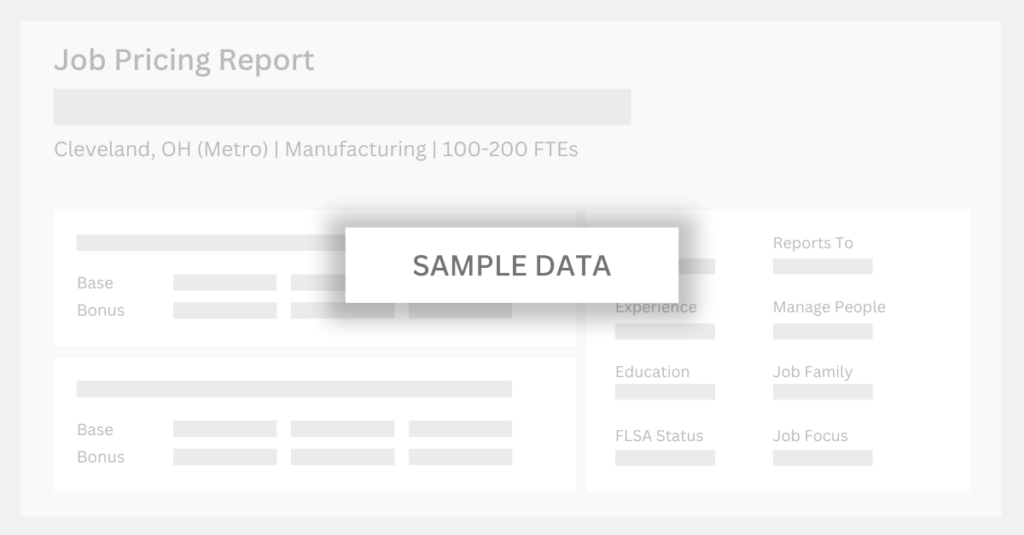Compensation Data for an HR Generalist in Ohio

Compensation data breakouts:
- Location (example: Cleveland, Akron, Ohio, National)
- Company Size (number of full-time employees)
- Industry (industry-specific or all industries)
- Years of Experience
- Education
Data included in each report:
- Base Compensation (Salary or Wage)
- Total Compensation
- Bonus
- Long-term Incentives
- Job Description
- Competencies/Skills
Get a Free Sample Report
Submit the form below to receive a sample job pricing report or to access ERC’s compensation data.

ERC is a leading provider of compensation data
Whether you’re actively recruiting and hiring or trying to stay competitive, having local salary and wage data is critical. ERC members gain access to compensation reports, job description research, and an HR Help Desk for compensation and workplace practices data.
Job Description
Overview
- Assesses personnel policies, programs, and procedures, and informs employee and management personnel on the interpretation of them.
- Performs professional level human resources work and carries out responsibilities in one or more functional areas, such as, staffing, employee relations, compensation, training, employment, labor relations, safety, affirmative action and employment equity programs, and personnel research.
Typical Functions
- Carries out administrative work involving the human resources functions and maintains related records.
- Ensures that programs are carried out in accordance with company’s policies and procedures.
- Analyzes and provides advice to supervisors and managers on methods and approaches to resolve employee work problems.
- May make presentations to explain the purpose and goal and to seek compliance and understanding of human resources policies.
- May conduct research to determine the effectiveness of personnel programs and policies.
- May develop and propose improvement to policies, programs, and procedures to improve the effectiveness of human resources and operations.
- May have lead or professional responsibilities over lower level support and clerical personnel.
- May be responsible for implementing and evaluating revised human resources policies.
- Provides other human resources services as needed.
Similar Positions
There are several positions that share similar responsibilities to an HR Generalist, including:
- HR Coordinator
- HR Manager
- HR Business Partner
- Talent Acquisition Specialist
- Employee Relations Specialist
- Compensation and Benefits Specialist
- Training and Development Specialist
Experience and Education
The amount of experience required for an HR Generalist can vary depending on the employer and the specific job requirements. However, typically, an HR Generalist position requires at least 2-3 years of relevant experience in human resources. Some organizations may require more experience, particularly for senior-level HR Generalist roles that involve managing a team or overseeing multiple HR functions.
The level of education required for an HR Generalist can vary depending on the employer and the specific job requirements. Generally, a bachelor’s degree in human resources or a related field, such as business administration or organizational psychology, is preferred for entry-level HR Generalist positions. However, some employers may accept candidates with relevant work experience in lieu of a degree.
In some cases, employers may require a master’s degree in human resources or a related field, particularly for more senior-level HR Generalist positions or those with a strategic focus. Additionally, earning certifications such as the Professional in Human Resources (PHR) or the Senior Professional in Human Resources (SPHR) can demonstrate expertise in the field and make a candidate more competitive for HR Generalist positions.
Competencies and Skills
- Compensation & Benefits
- Employee Communications
- Employee Data Management
- Employee Relations
- Employment Authorization
- Full-Cycle Recruiting
- HR Policy Administration
- HR Regulatory Environment & Compliance
- Onboarding
- Performance Management Programs
- Training Delivery
- Human Resource Management Systems (HRMS)
FAQ
An HR generalist and an HR administrator are two different roles within the HR department, with different responsibilities and duties.
An HR administrator typically focuses on administrative tasks related to the HR department, such as maintaining employee records, processing payroll, and managing benefits enrollment. They may also assist with recruiting efforts by posting job listings, scheduling interviews, and conducting background checks. Overall, the HR administrator is responsible for ensuring that the HR department operates efficiently and effectively.
On the other hand, an HR generalist typically has a broader range of responsibilities and duties than an HR administrator. They may be involved in all aspects of HR, including recruitment, employee relations, performance management, training and development, and compensation and benefits. HR generalists often work closely with management to develop HR policies and strategies that align with the organization’s goals. They may also be responsible for analyzing HR data and making recommendations to improve HR processes and practices.
An HR Generalist and an HR Manager are two different roles within the HR department, with different responsibilities and duties.
An HR Generalist is typically responsible for a wide range of HR functions, including recruitment, employee relations, performance management, training and development, and compensation and benefits. They may also be responsible for analyzing HR data and making recommendations to improve HR processes and practices. HR Generalists work to ensure that the HR department is operating efficiently and effectively and that the organization’s HR policies and practices align with the organization’s goals.
An HR Manager, on the other hand, is typically responsible for managing a team of HR professionals and overseeing the HR department’s operations. They may also work closely with senior management to develop and implement HR strategies that align with the organization’s overall goals. HR Managers often have significant experience in HR and are responsible for leading the HR team in developing and implementing HR policies and practices that promote the organization’s goals and values.
Through frequent polls and surveys, ERC offers a comprehensive collection of recent, reliable data covering workplace practices, employee compensation, benefits, wages, and salaries from local, regional, and national samples.
While “free” compensation data can be found on the web, here’s why you should be cautious:
- Validity — Often “free” salary data is collected from anyone willing to participate or share information. This means you don’t have a good sense of how big the sample size is, the geography of the data, or the type or size of organizations from which the data is being collected.
- Recency — ERC’s survey data relies on regular and consistent participation to ensure that the data is recent, while “free” pay data sources may provide data that is many years old.

